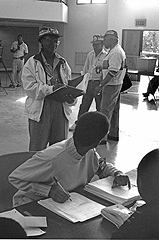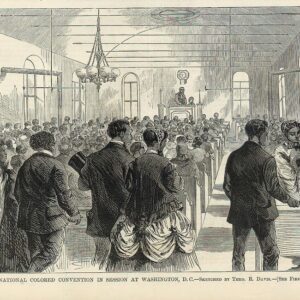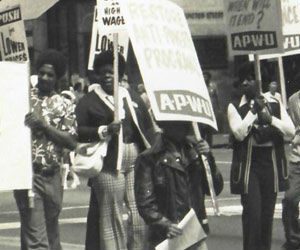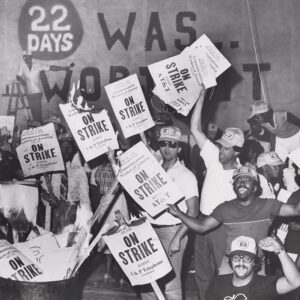December 31, 2013
APWU Helps Usher in the End of Apartheid
Editor’s note: Former South African President Nelson Mandela died on the same day this article went to press, Dec. 5, 2013. The APWU joins the world in mourning the passing of this great freedom fighter, who, like Gandhi and King before him, continues to inspire people around the world.
Twenty years ago South Africa held its first free and fair election. Amid violent attacks by groups seeking to disrupt the historic vote, a delegation of APWU representatives traveled to South Africa to act as election observers.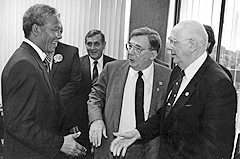
The decades-long international struggle to end South African apartheid — the system of racial subjugation that denied the black majority basic human rights — reached a peak in the 1980s. In the United States, the efforts of civil rights groups, religious organizations, student groups, and labor unions culminated in legislation that required our government to impose economic sanctions on the hated South African regime.
Bowing to international pressure, in 1990 the South African government freed anti-apartheid leader Nelson Mandela, who had been a political prisoner for 27 years. Banned political parties were “unbanned.”
In 1992, lengthy negotiations with South African President F. W. de Klerk produced an agreement to allow all adult residents, regardless of race, to vote for a new government on April 27, 1994. As leaders of their respective political parties, Mandela and de Klerk became the two major candidates for president.
But in the weeks and months before the voting, violence and political strife threatened the election. The world watched and waited for outcome.
‘Anything Could Happen’
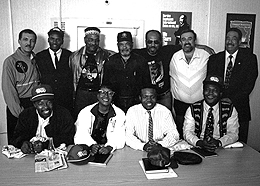 In response to a call from the South African union movement, on April 20 the AFL-CIO sent an 89-member delegation to act as election observers, joining thousands of other international visitors.
In response to a call from the South African union movement, on April 20 the AFL-CIO sent an 89-member delegation to act as election observers, joining thousands of other international visitors.
APWU President Moe Biller dispatched seven people from APWU headquarters: Human Relations Director Sidney Brooks, MVS Division Assistant Director Teddie Days, Legislative Aide Myke Reid, Retirees Department Director John R. Smith, the Maintenance Division’s National Representative- at-Large Malcolm Smith and Assistant Director Randy Sutton, and Special Assistant to the President Judy Beard.
Because of the widely-reported acts of violence in the weeks leading up to the trip, APWU observers weren’t sure what to expect when their plane landed in Johannesburg. “All we knew was that we were walking into this violent society, that essentially anything could happen,” Reid recalled.
Upon arrival, they were thrilled to be met on the airport tarmac by hundreds of schoolchildren welcoming them with a dance. “The tarmac was shaking from the joy they showed in welcoming us” Beard said.
But the next day the APWU team was reminded of the dangers when a bomb exploded at the airport. A subsequent bombing two blocks from their hotel killed 16 and “brought home the seriousness of what we were doing,” recalled Days. Another bomb targeted South African union offices in Pretoria where Reid was set to attend a meeting, but it was detected and defused. Despite the dangers, the APWU observers were undeterred. “Let me assure you for myself and for the rest of us,” Malcolm Smith told South African union leaders, “we’re going to do what we came here to do.”
APWU observers of the South African elections met with leaders of the Post and Telecommunication Workers Association and toured a postal facility in Johannesburg. Seated is Judy Beard, flanked by POTWA officers. Standing left to right are Myke Reid, POTWA President Lefty Monyokolo, Sidney Brooks, John R. Smith, Malcolm Smith, Randy Sutton and Teddie Days. Click here to watch a video about the trip.
Fanning Out to Polling Places
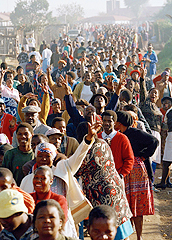 After receiving training on proper election procedures, the APWU group fanned out to assigned polling sites in Johannesburg, Kimberley, New London, Pretoria and Vereeniging. Before departing on each trip, they would check under the car for explosives.
After receiving training on proper election procedures, the APWU group fanned out to assigned polling sites in Johannesburg, Kimberley, New London, Pretoria and Vereeniging. Before departing on each trip, they would check under the car for explosives.
Working with other union activists on behalf of the Independent Election Commission of South Africa, the observers were charged with monitoring all activities at their polling stations to make sure, as Days put it, “there wasn’t any hanky-panky going on.”
The union observers visited the polls for the three days allotted for voting — and longer in places where voting was extended due to a variety of problems: Missing, late, or hijacked supply trucks, and massive lines in non-white areas. Some voting stations lacked the pencils needed to mark the paper ballots.
The observers were also assigned to watch the vote counting after the polls closed, a process sometimes complicated by unofficial ballot containers that arrived unsealed at the tallying sites.
Despite some glitches, the election took place without major disruptions.
APWU observers were awestruck by the patience of people who lined up at the polls. Twenty years later, they recall watching first-time voters wearing their Sunday best while waiting for 12 or more hours to vote. They remember seeing family members and friends carrying elderly and disabled voters to the polls. Most of all, they recall the hope they saw in people’s eyes.
The South Africans they worked with “made every effort to give everyone an opportunity to vote, including the sick and the incarcerated,” said Reid. “I wish we made as much of an effort in the United States.”
Dignity Amid Impoverishment 
In addition to their official duties, the APWU observers found time to visit with some South Africans and were struck by how they maintained great dignity amid impoverished conditions. Beard described a visit to the home of one of the union members assigned to travel with her: “His home had a dirt floor, yet his wife was sweeping it, to remove rocks and scraps of trash.”
Beard was struck by the fact that “in the post offices over there, Blacks could not be clerks; they could only be custodians.”
When their job was done, several observers said the South Africans they met appreciated their acts of solidarity. “People just walked up to me, shook my hand and said, ‘Thank you very much for making sure we had a free and fair election,’” Beard recalled. “Thank you for making it your business, to have an interest in liberty and democracy in South Africa” said Lefty Monyokolo, president of the South African Post and Telecommunication Workers Association (POTWA). “We won’t forget it.”
Members of the APWU delegation will never forget the trip either.
Reid recalls seeing the new South African flag raised for the first time: “I was so proud of the South Africans, for what they accomplished and the way they went about it. It was a very exciting time.”
Reflecting on the trip, Days said, “I know for a fact that my brothers and sisters in the APWU are absolutely proud that there were six of us that were not afraid” to take the risks involved. “We came here to represent APWU members,” he said.
Elected with almost 63 percent of the vote in a seven-candidate field, Nelson Mandela was sworn in as South African President on May 10, 1994, as more than a billion people watched on television. Twenty years later, he is revered as the father of the new South Africa

